Bridgerton is an alternate history regency romance series that is based on the book series by Julia Quinn and is created by Chris Van Dusen for Netflix. Produced by Shonda Rhimes, the show focuses on the siblings of the influential Bridgerton family, as they each try to find a suitor and match for themselves in the highly competitive social season. The show is a smash hit with viewers and critics and is noted for its alternate take on history, where racism is abolished and even people of color hold aristocratic titles. Set in the Regency Era, the show has a lot of interesting words and phrases specific to that time. Therefore, here are 10 such words and phrases that one should incorporate into one’s vocabulary.
Facer, Rake, and other words and phrases used in Bridgerton
1. High in the Instep
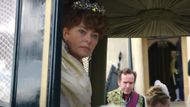
Let’s start with the phrases. Bridgerton has many words and phrases specific to the Regency Era, in which the show is set. Therefore, one of those phrases is “High in the Instep”. The phrase refers to those people who think highly of themselves, or in simple words, are arrogant or conceited. The phrase’s backstory might come from the fact that the royals and the nobility were thought to have higher foot arches (insteps) than the working class. This is because the lower-class people worked hard and had poorly made shoes, resulting in flatter feet. The phrase is generally used as an insult or sarcasm for people who are arrogant. The particular phrase was hinted at in the first season when Daphne is conscious of her social class and is worried that after marrying Simon, when she visits his lands, the people there will see her as arrogant. However, a misunderstanding causes some locals to be suspicious of her, but Daphne is considerate enough not to let herself place herself higher than others.
2. The Social Season
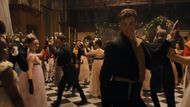
Another popular phrase from Bridgerton is “The Social Season”. This phrase is perhaps of utmost importance because the whole dynamics of the show revolve around finding a match and suitors for each other. The exact meaning of the phrase refers to a few months out of the year, when the high-class and wealthy members of London Society, especially the young members, can attend events and balls, specifically designed for them to mingle and search for a suitor for themselves. Some sources say that the months of April to August were considered the best months for such occasions because the weather was mild and which allowed men and women to wear the most elaborate clothing without fearing destruction from snow or heat. The season has a lot of events organized within it, and the younger members of the posh society can make connections and find a match for themselves. Further, the season also includes a “calling hour”, where suitors can visit the homes of the young ladies they are interested in. This time is serious and important for families hoping to find a match for their daughters.
3. Skied

While the word is not used as often as the other words and phrases in Bridgerton, it is still a peculiar and specific word to the era in which the show is set and is therefore an important word to be added to one’s vocabulary. The word pertains to art and comes from the Regency Era tradition that focused on covering walls with paintings that were so high that they covered the floor to the ceiling. This practice resulted in some works of art being hung so high on the wall that they could not be seen. This resulted in the invention of the word “skied”. Benedict Bridgerton is one character on the show who is an artist, and therefore, when Benedict first meets Sir Henry Granville, he insults the former’s work by mentioning that his art should have been “skied” along with other undesirable pieces. The term was therefore also used to insult those artists whose work was not deemed high enough and should therefore be above the eyelines of the people in a room.
4. Coming Out/Debuting

While the phrase “coming out” has a different meaning in the modern times—being associated with the act of a queer person accepting their sexuality publicly—in the Regency Era in which Bridgerton is set in, the phrase had a totally different meaning. Often used alongside other words like “debuting”, the phrase refers to the tradition of young girls from high-class families formally entering the marriage market. “Coming out” is a whole ceremony, and young ladies have to formally debut in society by making a formal debut in front of the queen. They must wear white dresses to prove their chastity, and a guardian has to be present as the girl curtsies to the queen. The queen then decides if she wants to help the girl find a match or just observe them during the social events. In the show, Daphne, Cressida Cowper, and other young ladies went through this ceremony to begin finding matches for themselves.
5. The Ton
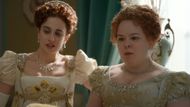
One of the phrases or terms that is often used in Bridgerton, “The Ton”, refers to the British high society. Many of the characters in the show use the term, which means all of high society. Sources say that term might have come from the French phrase, “le bon ton”, which means good manners or etiquette. Therefore, there is an important connection between the British high society in Bridgerton and an emphasis on culture and propriety. The importance is so strong that the term that denotes the upper class symbolizes propriety directly. For example, the members of “the ton” have specific and strict rules, like not allowing young ladies to be unchaperoned. In terms of economic and social status, “the ton” also refers to only those people who belong to old money and therefore make up people with titles and families of landowners. The working class cannot be a part of it, even if some of them rise up the ranks.
6. Facer
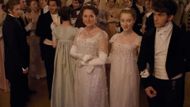
“Facer” is an interesting word that is used in Bridgerton and even has a funny meaning. The term refers to an efficient manner of punching someone in the face. An example of the word is when Daphne Bridgerton delivers a perfect facer to Lord Berbrooke, who crossed the line with her in the garden. The show has many shining examples of interesting words and phrases, and “facer” is one of them. While some of the terms are more serious, this one feels like a slang term of the Regency Era. The show has the capability to make people learn some interesting terms and add them to their vocabulary. Viewers who love historical romance should definitely watch Bridgerton, as it has all the popular words used in the genre and the Regency Era. While the show’s language is not always historically accurate, it does have some quirky and hilarious words like the “facer” that one should definitely add to their list of words to be used in everyday life.
7. Rake

While there are many words for a woman’s character or lack thereof, it is refreshing to see that there are some words for the behavior of a man as well. In Bridgerton, the word “rake” refers to a man who engages in immoral behavior, is lascivious, and is a womanizer. The term also refers to men who indulge in drinking and gambling. Basically, the term is used as an insult for any man who spends money on hedonistic activities. In the show, Simon Basset is famously called a “rake” because of his drinking and seductive personality. Similarly, Anthony Bridgerton is also a “rake” as he is seen in Bridgerton, spending money on boxing matches and unmarried women. The term is one of the most frequently used words in the show and holds a lot of importance as it describes the character of a young man and whether he will be a sound suitor and husband. While Violet Bridgerton defends Simon’s “rakish” reputation, most people in the Regency Era stayed away from such men for their daughters’ marriages.
8. Being Ruined
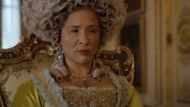
This phrase is a popular one, and even though it comes from the Regency Era and is used heavily in Bridgerton, there are still some people in modern times who also like to use such regressive terms for women. The term stems from the fact that a woman’s virtue is associated with her being chaste before marriage, and if she indulges in intimate acts outside of marriage, she is immediately given the label of “being ruined”. For example, in the show, Marina’s pregnancy becomes public and she is deemed the status of a “ruined” woman. If a woman in those times was considered “ruined”, it led to a lot of scandal, and the term had so much power that even other ladies who were still “chaste” would be reprimanded for being associated with “ruined women”. While there are many progressive points in the show, like the removal of racism, there still are some regressive aspects like such as words, which authentically point out the strict social practices of the era.
9. The Marital Act

Another term in Bridgeton, which was problematic in some sense, was the phrase “marital act”. The term refers to the act of intimacy, and any other word is not used because it would be too vulgar and inappropriate for young ladies to hear. However, the word is problematic as it leaves many women lost and confused, and therefore illiterate about safe se*ual practices. For example, Daphne has no knowledge about s*x and how a woman becomes pregnant. Her own mother is uncomfortable speaking to her about the topic, and she has to ask her maid Rose, for education on the subject. Therefore, terms like these hinder women from knowing and understanding safe s*x. While men had the privilege to galivant and know about the act without the constraints of any taboos, women did not have any resources at hand and had to also deal with societal mores and cultures that shamed them for knowing about it.
10. With Child
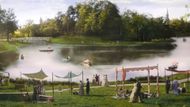
Another term in Bridgerton that did not want to address topics about women’s se*uality and pregnancy without being direct is “with child”. Like the word “courses” is used for periods, so is the term “with child” used to refer to pregnancy. There are also some other words like “increasing”, “in the family way”, and “lying in”. Interestingly, there is so much mystery with regards to normal womanly habits and way of life, that instead of directly stating how it is, society deemed it necessary to have a plethora of synonyms instead. Words like these are another example of how restrictive the society was towards women and their natural bodily functions. Apart from social mores and taboos, the society even made it a point to cover and hide with the help of language as well. In the show, there are various scenes where women who are pregnant are never directly referred to by that word, but instead, euphemisms are used. Some of these words, like “in the family way”, are still used in modern times.
